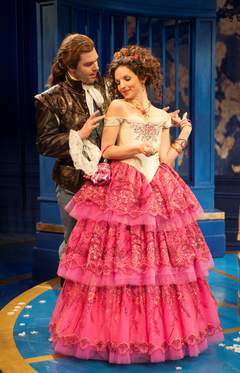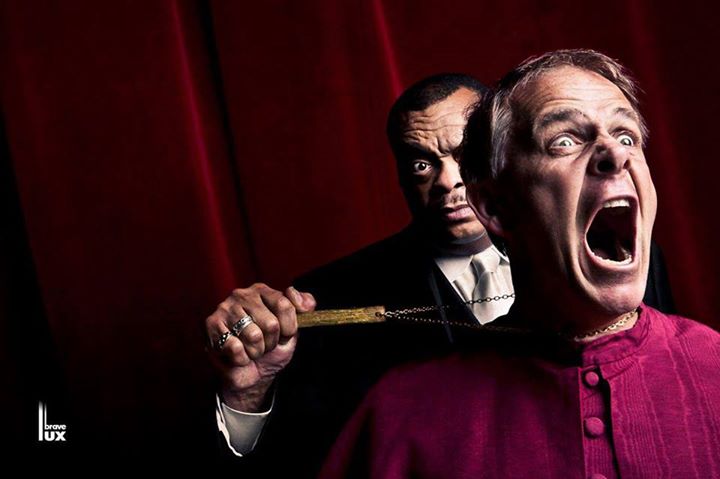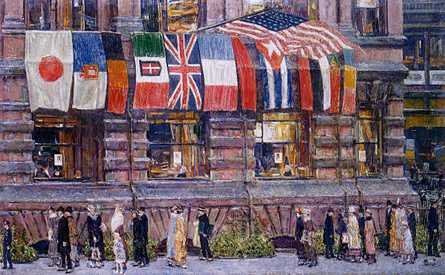Philip Lambert, Alec Wilder (University of Illinois Press, $29.95). An important, impressively readable new monograph about a composer-songwriter who straddled the worlds of popular and classical music with unprecedented aplomb. The emphasis is on the music, but proper attention is paid to Wilder’s life as well (TT).
Archives for 2013
GALLERY
Wolf Kahn (Ameringer McEnery Yohe, 525 W. 22, up through July 26). New paintings by a criminally underappreciated, philosophically minded modern master, a Hans Hofmann pupil who passes his memories of the visible world through the transforming prism of abstraction (TT).
TT: Why music competitions don’t work
In today’s Wall Street Journal “Sightings” column I discuss the poor track record of big-money music competitions–and suggest an alternative. Here’s an excerpt.
* * *
Boris Giltburg, an Israeli pianist who won Belgium’s Queen Elisabeth Music Competition last month, has mixed feelings about his victory. “I’m a bit angry at the world for not having come up with another way of discovering talent other than competitions,” he recently told a Reuters reporter, going on to say that he’d never serve on a jury for a classical-music competition.
Mr. Giltburg’s comment attracted widespread attention–but it shouldn’t have. The only thing surprising was that the person who said it had just snagged first-place honors in one of the world’s most prestigious musical competitions. Such high-pressure events have long been regarded with suspicion by serious artists….
What would it mean for an artistic competition to “work”? Van Cliburn was catapulted to worldwide celebrity when he won Russia’s International Tchaikovsky Competition in 1958, and since then his victory has been cited as the quintessential example of how such events can make a crucial difference in the lives of gifted artists. But Cliburn retired from the concert stage two decades later, worn out and burned out at the unripe age of 43, and most observers put much of the blame for his disintegration on the unnatural effects of his having become becoming an overnight superstar.
Even more to the point, Cliburn is the only classical musician to whom such a thing has happened. It’s been a half-century since any of the first-prize winners of the Queen Elisabeth Competition went on to have indisputably major solo careers. And Fort Worth’s Van Cliburn International Piano Competition, launched in 1962 in honor of the Texas-born pianist, is notorious for picking gold medalists who fail to make it into the top tier of renown….
Mr. Giltburg’s complaint set me to thinking: Given their record of near-total failure to identify artists of promise, why does anyone still bother to hold music competitions at all? It seems clear that they’ve become obsolete, even irrelevant–especially now that the road to success for classical musicians is no longer as well defined as it was in 1958….
* * *
Read the whole thing here.
A scene from the 1980 film The Competition, starring Lee Remick and Amy Irving:
TT: Almanac
“A partnership with men in power is never safe.”
Phaedrus, Fables
TT: Oh, say, can you dig it?
Louis Armstrong plays “The Star-Spangled Banner” in 1960:
TT: Even Horowitz might be impressed
Chet Atkins plays “The Stars and Stripes Forever”:
TT: The French, they are a funny race
In Friday’s Wall Street Journal drama column (which is already available on line) I review a pair of Chicago-area productions of classical French comedies, Writers’ Theatre’s The Liar and the Court Theatre’s Tartuffe. Both are must-see shows. Here’s an excerpt.
* * *
 What’s the funniest play ever written? I used to think it was “Noises Off,” but now that I’ve seen “The Liar,” I’m not so sure. David Ives’ English-language adaptation of Pierre Corneille’s 1643 comedy about a compulsive liar, was commissioned by Washington’s Shakespeare Theatre Company and premiered there three years ago to universal acclaim. Since then it’s been making the regional rounds, and I finally caught up with it in the suburbs of Chicago, where Writers’ Theatre is giving “The Liar” a frenziedly farcical production at which I laughed so hard that I was sore the next day.
What’s the funniest play ever written? I used to think it was “Noises Off,” but now that I’ve seen “The Liar,” I’m not so sure. David Ives’ English-language adaptation of Pierre Corneille’s 1643 comedy about a compulsive liar, was commissioned by Washington’s Shakespeare Theatre Company and premiered there three years ago to universal acclaim. Since then it’s been making the regional rounds, and I finally caught up with it in the suburbs of Chicago, where Writers’ Theatre is giving “The Liar” a frenziedly farcical production at which I laughed so hard that I was sore the next day.
Unlike Richard Wilbur, whose 2009 translation of “The Liar” is miraculously faithful to both the spirit and the letter of the original play, Mr. Ives has given us a free “translaptation” (his word) whose comic effects arise in part from his use of contemporary language squeezed into the tight mold of rhyming couplets: “I? Wed some shrew? Obscene, oblong, obese?/And not the fair, the fine, divine Lucrece?” By wedding his verbal prestidigitation to Corneille’s mistaken-identity plot–to which he’s added the additional complication of a pair of identical twins–Mr. Ives has come up with a play in which the laughs flow freely and joyously.
William Brown, one of Chicago’s best directors, deserves much credit for ensuring that “The Liar” flies down the tracks at the speed of lunacy….
Improbable as it may sound, two very different productions of 17th-century French comedies are simultaneously playing in Chicago, and both of them are memorable. The Court Theatre, which led off its two-play Molière Festival last month with “The Misanthrope,” has now upped the ante with a modern-dress “Tartuffe” that is–amazingly–even better than its splendid predecessor.
 Like “The Misanthrope,” this “Tartuffe” is being performed by a mostly black cast, and Charles Newell, the company’s artistic director, has chosen again to use Richard Wilbur’s supremely elegant verse translation of Molière’s ever-relevant tale of a monstrously hypocritical preacher (Philip Earl Johnson) who cozens his way into the family circle of Orgon (A.C. Smith), a gullible gent whose wife and fortune he covets with like intensity. As always, Mr. Wilbur favors dry wit over knock-down comedy, but his version of “Tartuffe” is more than funny enough to lend itself to the raucous touches of physical comedy with which Mr. Newell has salted his staging.
Like “The Misanthrope,” this “Tartuffe” is being performed by a mostly black cast, and Charles Newell, the company’s artistic director, has chosen again to use Richard Wilbur’s supremely elegant verse translation of Molière’s ever-relevant tale of a monstrously hypocritical preacher (Philip Earl Johnson) who cozens his way into the family circle of Orgon (A.C. Smith), a gullible gent whose wife and fortune he covets with like intensity. As always, Mr. Wilbur favors dry wit over knock-down comedy, but his version of “Tartuffe” is more than funny enough to lend itself to the raucous touches of physical comedy with which Mr. Newell has salted his staging.
Yes, there’s a racial angle–Tartuffe is white, Orgon and his family black–but Mr. Newell doesn’t stress it. The focus is on class, not race, and though you’re free to interpret Tartuffe’s motives as you please, this production is not political in any crudely obvious way….
* * *
Read the whole thing here.
A trailer for The Liar:
TT: Picture this
Childe Hassam’s “Allied Flags, Union League Club,” painted in 1917:

